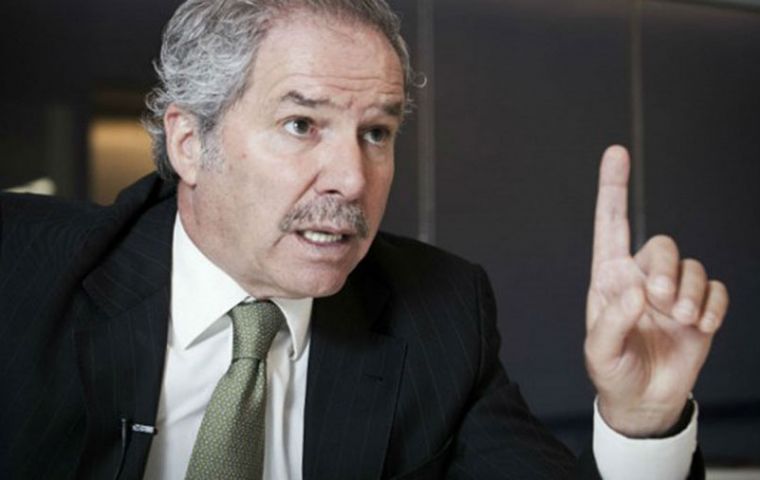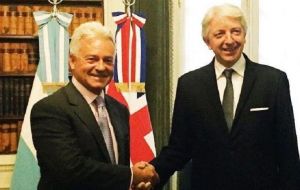MercoPress. South Atlantic News Agency
Solá confirms end of fisheries info exchange with Falklands: on this, they decided how many licenses to award
 ”To protect our rights, we decided to suspend the information exchange and we are no longer going to notify them our squid catches because when we did, we were telling, the usurpers, how many licenses
”To protect our rights, we decided to suspend the information exchange and we are no longer going to notify them our squid catches because when we did, we were telling, the usurpers, how many licenses  The minister argued that the Foradi-Duncan accord only purpose was “to show that Argentina was in good relations with UK, and that is would not interrupt the development of the Islands”
The minister argued that the Foradi-Duncan accord only purpose was “to show that Argentina was in good relations with UK, and that is would not interrupt the development of the Islands” Higher fines to those illegally fishing in Argentine waters, including around the Malvinas Islands, is directed to discourage poachers, indicated Argentine foreign minister Felipe Solá who also defended the decision to interrupt the exchange of fisheries information on the South Atlantic bio-mass with the United Kingdom and the Falklands.
Solá said that the three bills sent to Congress, the National Advisory Council on Malvinas policies, demarcation of the outer continental shelf border beyond the 200 miles and increasing sanctions for illegal fishing in Argentine waters, contrast with the “low intensity” sovereignty policy, during the four years of the previous administration of former president Mauricio Macri.
“There are many species which interest us, but there is one in particular, squid which circulates freely in the South Atlantic and those volumes which we don't catch, are caught by vessels which pay licenses to the usurpers from Malvinas”, argued Solá regarding the illegal fishing fines, which will be implemented once the bill is approved by congress.
Interviewed by A24, Solá also defended the government's decision to interrupt the annual exchange of information with the UK about the evolution of the fisheries bio-mass in the Argentine maritime space, contemplated in the Foradori-Duncan statement signed in 2016 by the Macri administration.
”To protect our rights, we decided to suspend the information exchange (collected in Argentina by the Fisheries National Research and Development Institute, Inidep) and we are no longer going to notify them our squid catches because when we did, we were telling, the usurpers, how many licenses they could award“, underlined Solá.
The minister argued that the Foradi-Duncan accord only purpose was ”to show that Argentina was in good relations with UK, and that is would not interrupt the development of the Islands“
And that is why we decided to change the consequences of that accord between deputy minister Foradori and his British peer, Alan Duncan, which ”was not a roadmap as our predecessors pretend, but rather an accord in which Malvinas and Malvinas discussions were no longer the center piece of the matter“.
”Former president Macri deployed a Malvinas low intensity policy. What do we mean by low intensity? Dissimulate the Malvinas issue. It was like telling the UK, “we're getting on fine, what a pity the Malvinas issue”.
Finally Solá said that the government with the new fines' increases for illegal fishing, wants to update the values which date back to 1997.
“The lowest fine will be equivalent to 300,000 liters of diesel oil, plus all the value of the catch in the holds, plus the cost of pinpointing and escorting the poacher to the closest port in the cost”,
Last but not least Solá said that the integrated Malvinas Advisory Council will help design, address strategies and guarantee medium and long term consensuses .




Top Comments
Disclaimer & comment rules-

-

-

Read all comments“squid which circulates freely in the South Atlantic”,
Jun 16th, 2020 - 11:59 am +7Yes and only by monitoring stocks/catches across both territorial zones can you know what the TAC (total allowable catch) is and therefore what can be sustainably caught, across both zones.
Back to environmental warfare, with the Argys trying to catch all the squid before they get to Falklands waters.
Never mind that much fewer squid will then be passing through Argy waters next year.
And in a few years none.
No wonder they can’t run an economy.
Gullible, you really need to do some research. The joint Fisheries Commission and its checkered history, goes back to the 1989/90 agreements. The reason was, and is, quite simple. The collation of data assists both sides in reaching decisions on what fishing to allow, and where. The islanders see it as science. Argentina sees it as politics.
Jun 17th, 2020 - 12:50 am +6The old 'un will be along right soon I suspect ;-)
Sharing information on fisheries and resources is part of the Madrid Agreement (Tratado de Madrid) signed between Argentina and the United Kingdom during the presidency of Carlos Menem. The irony of all this is that Felipe Sola (a makeshift in foreign relations) was Minister of Agriculture and Fisheries at the time of the signing of the agreement and, at that time, did not question the collaboration with the United Kingdom in the control of ocean natural resources.
Jun 17th, 2020 - 02:35 pm +6@Guillote
Sharing information is important and beneficial to monitor and know the state of the fishing resource and, thus, be able to determine the fishing quotas in the coming years. Basically, it is important to take care of OUR natural resources
Commenting for this story is now closed.
If you have a Facebook account, become a fan and comment on our Facebook Page!